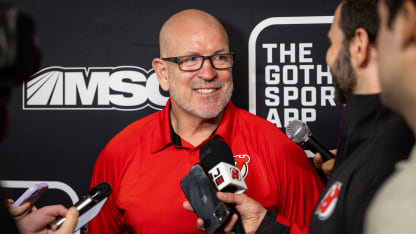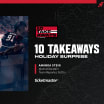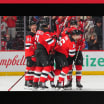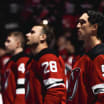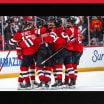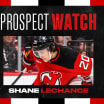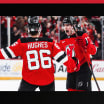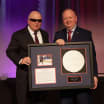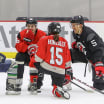Devils general manager Tom Fitzgerald met with the media on Wednesday afternoon. Here are some of the highlights of that discussion…
Luke Hughes Contract is Top Priority
On three separate occasions, Fitzgerald noted that his top priority for this off-season is signing defenseman Luke Hughes to a contract extension. Hughes, the fourth-overall pick in 2021, was tendered a qualifying offer, which allows the Devils to retain his rights for next year. But both sides are working on a long-term deal.
“I talked to his agent (Tuesday). We said, ‘Let’s enjoy the holiday weekend and we’ll start talking after,’” Fitzgerald said. “He’s excited. He wants to be a Devil long term—just like his brother (Jack). We’re excited about that.
“Players want to stay here. They want to be in New Jersey. They want to be part of something we’re creating. The standards are getting higher with each year, which is exciting. I don’t sense anything other than Luke wants to be a Devil for a long time.”
More Roster Moves
Fitzgerald may not be done making moves this off-season. However, how much cap maneuverability he has will depend on where Luke Hughes’ contract lands.
“What I do with Luke will determine what else I could do,” Fitzgerald said. “If we went into the season with this group of players, we touched on (Arseniy) Gritsyuk and the excitement we see. Hopefully he comes into camp—can he be a top-six player? Immediate help? I don’t know. Adding (Evgenii) Dadonov and (Connor) Brown helps. Cody Glass, having him for the start of the season versus grabbing him at the deadline, I think we’ll see a more comfortable player. (Juho) Lammikko is another guy we brought in to help with depth. Big, 6-3, can skate. Can he be a younger Lars Eller type? Help with D-zone faceoffs, penalty kill? He’s got the size.
“There are a lot of unknowns, but a lot of excitement that comes with that.”
(De-)Centralized Draft
The NHL changed to a de-centralized draft for 2025. It allowed NHL teams’ staffs to remain home instead of traveling to one location. Whether or not it remains that way for next season or goes back to the way it was held before is to be determined.
“I voted to have a decentralized draft. I’m open to going back,” Fitzgerald said. “The reason I voted that way was travel. The Stanley Cup is being handed out later every year. The draft used to be the third week of (June), and you had a week to prepare.”
Now, the NHL Draft is held close to the opening of NHL free agency. Last season, the Draft was on June 28 and 29. Giving teams limited time to return for the quick turnaround.
“Traveling back from Vegas or LA—it really hurt us. You’re taking red-eyes back. I just preferred waking up in my own bed,” Fitzgerald said. “Also, communication with teams was easier (when centralized). When you’re out east trying to get ahold of a team out west, you usually have to wait for their working hours. I enjoyed being on the same time zone and being able to just pick up the phone. But I’m open to anything.”
Neck Guards
In recent years, Fitzgerald has been a vocal supporter of the NHL adopting neck guards for players to wear. Starting with the 2026-27 season, neck guards will be grandfathered in with it being mandatory for all new players.
“I think it’s great. To me, it’s no different than the helmet or the half shield,” said Fitzgerald, who is on the cut-resistance equipment committee. “I just think kids won’t even realize they’re wearing it, just like the helmet and shield for players in the past. I think it’s a great start for the league. Anytime you can continue to look after your players, especially young players as they grow into the league, and help them stay protected, and more importantly, educate them on the different types of things out there that can help them, that’s important.”
Fitzgerald’s situation is personal. His son Casey, a defenseman with Hartford of the American Hockey League last season, sustained a cut on his neck from a skate. Casey was wearing a cut-resistant guard, but the cut occurred above the guard and could have been life threatening.
“If you give (players) options (to not wear protection), they’re going to take it,” Fitzgerald told NHL.com in March. “They’re going to say, ‘I haven’t worn it my whole life so I’m not going to wear it now.’ So don’t give them options.”

